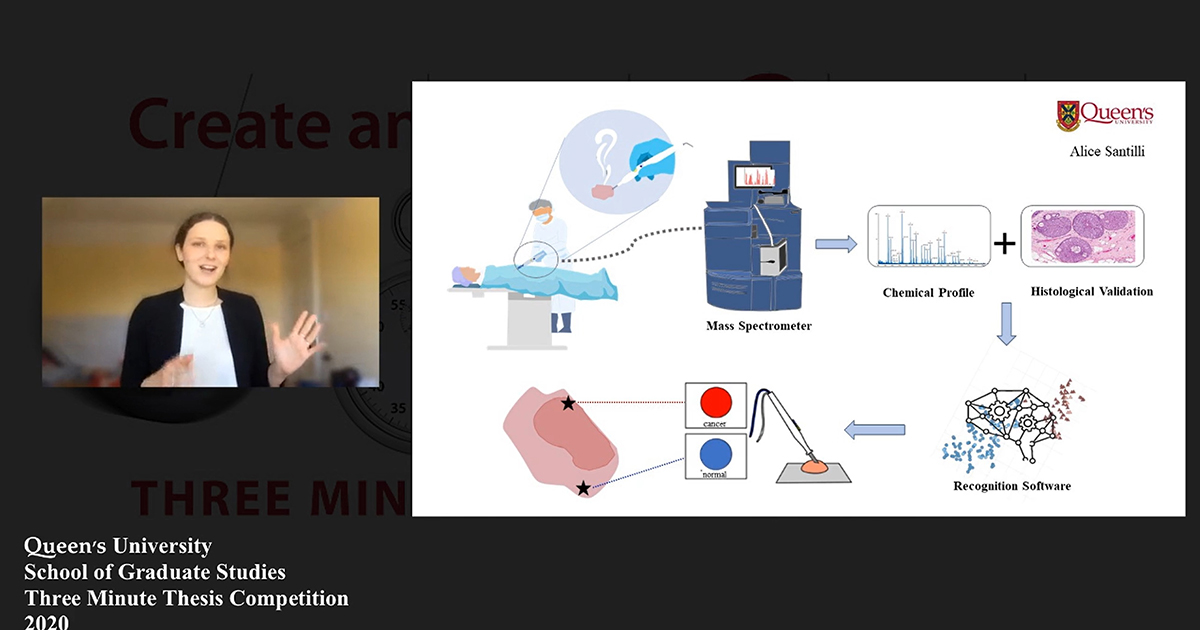No stopping the Three Minute Thesis
May 22, 2020
Share

Every cancer patient who goes to the hospital for a treatment hopes it will be their last.
Alice Santilli, a masters candidate in the Queen’s School of Computing, wants to turn that hope into more of a reality for breast cancer patients.
“Around 40 percent of women who currently go through breast tumor removal in Canada will leave their surgery with breast cancer cells remaining in their bodies,” says Santilli, likening the process to unsuccessfully weeding a garden.
So, how do you keep the ‘weeds’ out in this case? Her research aims to create an artificial intelligence-based model that will help surgeons tell the difference between skin cells, fat cells, and tumorous cells, which would minimize the likelihood of follow-up surgeries.
Her process involves using a device called a mass spectrometer to analyze the smoke being generated by a surgical tool known as an intelligent knife, or iKnife, during the surgery. The data being fed to the surgeon in real time would ensure the correct cells are removed.
Santilli’s exciting research and her strong presentation skills have earned her first place in the 2020 edition of the Queen’s Three Minute Thesis (3MT) competition.
Thesis presented in three minutes or less
3MT is an annual event where graduate students condense their research into a brief presentation for judges and a live audience. The judges score the presentations based on their communications style, the comprehensive nature of their presentation, and how engaging their performance was.
“I am glad the School of Graduate Studies team put the work in to allow this event to happen virtually this year so I could still participate,” she says. “I love presenting and enjoyed the opportunity to practice the skill of explaining my research to a non-technical audience.”
As the winner of the Queen’s competition, Santilli receives $1,000 and the opportunity to present Queen’s at the Ontario level competition. While the format for this year’s provincial Three Minute Thesis competition, which was to be held at the University of Windsor, is still unknown, Santilli says, if she gets to present again, she will be making some refinements based on the strong presentations by her peers.
“I actually turned my camera off after my presentation because I thought there was no way I had won,” she says. “There were so many great presentations.”
More winners
Sean Marrs, a PhD candidate in the Department of History, claimed second place and a $500 prize. His presentation focused on the establishment of an 18th-century surveillance state in Paris, France and draws parallels between Big Brother-style monitoring today.
“I learned a great deal in participating in the 3MT competition,” he says. “I learned how to better connect with a wide audience and certainly improved my presentation skills. Most importantly, writing and delivering a 3MT presentation forced me to clarify to myself and others the essential reason purpose of my research.”
Livestream viewers were also able to vote for a People’s Choice presentation, and they selected Arthi Chinna Meyyapapan, a masters candidate studying neuroscience. Meyyapapan’s presentation looked at how manipulating gut bacteria, particularly with personalized medicine approaches, could more effectively treat mood and anxiety disorders.
To watch this year’s presentations, and learn from our graduate student presenters, visit www.queensu.ca/3mt.